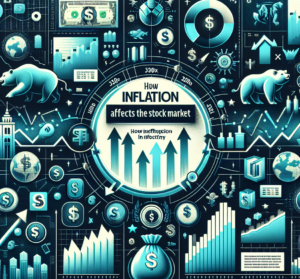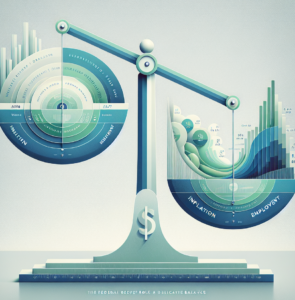
A Market in Decline
In early December 2024, the stock market saw a significant downturn following the release of a “warm” inflation report, signaling that inflation rates are rising faster than expected. This unexpected rise in inflation sparked a sharp sell-off, particularly in technology stocks, leading to a noticeable drop in the major stock indexes, including the S&P 500 and Nasdaq.
While inflation rates are often a key concern for investors, the ripple effects are particularly strong in certain sectors, such as technology. The Nasdaq, being heavily weighted with tech stocks, was hit the hardest, while the broader S&P 500 index also experienced a notable decline. This article delves into the factors driving this market behavior, how inflation impacts financial markets, and what investors can expect in the coming days. Additionally, we explore the role of the Federal Reserve and its policies in shaping the financial outlook.
Understanding the Impact of Inflation Reports on Stock Markets
What is a “Warm” Inflation Report?
A “warm” inflation report refers to data indicating higher-than-expected inflation. Inflation is the rate at which prices for goods and services increase, eroding the purchasing power of money. A report that shows inflation running higher than expected can be seen as a signal that the economy is overheating, meaning there is more demand than supply, which pushes prices up.
Inflation is crucial because it directly impacts consumer behavior, business costs, and the central bank’s monetary policy. A warm inflation report typically raises concerns about the potential for the Federal Reserve to increase interest rates to combat rising prices. Higher interest rates often cool down an overheating economy by making borrowing more expensive, which can slow consumer spending and business investment.
In this case, the inflation report showed a rise in both core inflation (excluding volatile food and energy prices) and headline inflation, defying market predictions for a slower increase. This surprised many investors and analysts, who were expecting inflation to stabilize after the Federal Reserve’s actions in the previous months. As a result, the market reacted with caution, especially among tech stocks, which are particularly sensitive to interest rates.
How Inflation Affects the Stock Market
Inflation can have various effects on the stock market, particularly in terms of investor expectations and central bank actions. When inflation is higher than expected, it typically leads to:
-
Rising Interest Rates: To combat inflation, the Federal Reserve may raise interest rates. While this can help curb inflation by slowing demand, it also increases borrowing costs for businesses and consumers. Higher borrowing costs can lead to reduced consumer spending and lower corporate profits, which negatively affects stock prices.
-
Impact on Corporate Earnings: Higher inflation can increase the cost of raw materials, labor, and other inputs for businesses. This can reduce profit margins, particularly in industries that are more sensitive to rising costs. Additionally, inflation erodes the value of future profits, which can hurt high-growth sectors like technology, where stock prices are often based on long-term earnings projections.
-
Shifting Investor Sentiment: Inflation data that surpasses expectations can lead to shifts in investor sentiment. Investors may become more risk-averse, moving away from growth stocks (like those in the tech sector) and towards defensive assets such as bonds or dividend-paying stocks. This shift in sentiment can lead to sharp declines in specific sectors, as seen in the recent drop in tech stocks.
The Role of Technology Stocks in the Market Decline
Tech Stocks in the Crosshairs
Technology stocks are particularly sensitive to inflation and interest rate changes. This is because tech companies are often valued based on future earnings potential. The logic behind this is simple: investors expect tech companies, especially growth-oriented firms, to generate significant profits in the future. As such, tech stocks are valued by discounting those future profits back to the present. The higher the interest rate, the less those future profits are worth today, which lowers the stock’s present value.
When inflation rises, it increases the likelihood that the Federal Reserve will raise interest rates. This can dampen investor enthusiasm for high-growth sectors like tech, as the future earnings of these companies become less valuable in a higher interest rate environment.
In the wake of the warm inflation report, tech stocks took a considerable hit. Major companies such as Apple, Microsoft, Amazon, and Alphabet all saw their stock prices fall, dragging down the broader Nasdaq index. The Nasdaq is heavily weighted toward technology and growth stocks, making it particularly vulnerable to inflation and rising interest rates.
Why Tech Stocks Are Vulnerable to Inflation
-
Valuation Sensitivity: As mentioned earlier, the valuation of tech stocks is often based on future earnings projections. When inflation rises, the Federal Reserve may raise interest rates to curb the inflationary pressures. This raises the cost of capital, which reduces the present value of future profits. The higher the inflation, the more likely it is that the future profits of tech companies will be discounted.
-
Higher Operating Costs: Many tech companies rely on a significant amount of capital investment to fuel growth. Rising inflation can increase the costs of raw materials, labor, and research and development, which may reduce profitability. These rising costs can squeeze profit margins, especially for companies in the tech sector that are not yet profitable.
-
Investment in Riskier Assets: Tech stocks are often seen as riskier investments due to their volatility and high growth expectations. In times of economic uncertainty, such as during inflationary periods, investors may pull back from riskier assets and shift towards safer investments like bonds or utility stocks.
Broader Market Implications: The S&P 500’s Struggles
S&P 500 Decline and Broader Market Sentiment
The S&P 500, which is composed of 500 large-cap U.S. companies, also saw a decline in the wake of the inflation report. While tech stocks were the primary driver of the market’s fall, other sectors, including consumer discretionary, real estate, and financials, also took a hit.
The S&P 500’s performance is often considered a broad indicator of the overall health of the U.S. stock market. When inflation rises, the Federal Reserve may increase interest rates, which puts pressure on various sectors of the economy. Higher rates can dampen demand for big-ticket items like cars and homes, which negatively impacts consumer discretionary stocks. Similarly, the real estate sector tends to struggle when interest rates rise because mortgage rates increase, making it more expensive for consumers to buy homes.
In addition to these factors, investors may become more cautious in general, leading to a broader market sell-off. This results in declines across a wide range of sectors, not just in tech.
The Role of Diversification in Mitigating Losses
While the tech sector was hit hardest by the recent market decline, the broader drop in the S&P 500 highlights the importance of diversification in investment portfolios. Investors who were heavily invested in tech stocks saw more significant losses, while those with diversified portfolios—spreading their investments across different sectors—may have fared better.
Diversification helps reduce the risk of significant losses by ensuring that not all investments are exposed to the same economic or market conditions. For example, if one sector is performing poorly (like tech), the performance of other sectors (such as utilities or consumer staples) can help offset those losses.
The Federal Reserve’s Role: A Delicate Balance
The Fed’s Dilemma: To Tighten or Not?
In the face of rising inflation, the Federal Reserve faces a difficult decision. On one hand, continued inflationary pressures could erode purchasing power and lead to long-term economic instability. On the other hand, raising interest rates too quickly or too much could stifle economic growth, as borrowing costs would rise for businesses and consumers alike.
To combat inflation, the Fed typically raises interest rates. This helps slow down consumer spending and business investment, which in turn reduces inflation. However, higher interest rates also increase the cost of borrowing, which can lead to a slowdown in economic activity. This creates a dilemma for the Federal Reserve, as it must strike a balance between controlling inflation and avoiding a recession.
The Impact of Rate Hikes on the Market
If the Federal Reserve decides to raise interest rates further, it could exacerbate the market decline, particularly in interest-rate-sensitive sectors like real estate, consumer discretionary, and technology. However, keeping rates too low for too long could lead to runaway inflation, reducing the purchasing power of consumers and eroding the value of investments.
The Fed’s policy decisions will be closely watched by investors, as any indication of future interest rate hikes or cuts could significantly impact the stock market. Investors are eager to understand whether the Fed will choose to tighten monetary policy further or if they will adopt a more cautious approach to avoid destabilizing the economy.
Live Updates: What to Watch in the Coming Days
As the market continues to react to the warm inflation report, here are a few key factors to watch:
-
Tech Sector Performance: The tech sector’s performance will be closely monitored for signs of stabilization or further decline. Any sharp moves in major tech stocks could significantly influence the broader market.
-
Upcoming Economic Data: Additional economic reports, including employment figures and consumer sentiment data, could provide further insights into the strength of the economy and whether inflation is continuing to rise.
-
Federal Reserve Statements: Statements or meetings from the Federal Reserve will be key. Investors are eager to hear any hints or updates on future interest rate hikes or the Fed’s stance on inflation control.
-
Corporate Earnings Reports: Earnings reports from major corporations will give investors a clearer picture of how companies are responding to inflationary pressures. These reports could provide valuable insights into which sectors are more resilient during periods of inflation.
Navigating the Uncertainty
The recent decline in the S&P 500 and Nasdaq, driven by a warm inflation report and the subsequent fall in tech stocks, serves as a reminder of the volatility in financial markets. While inflation remains a key concern, it’s essential for investors to stay informed about economic data and Federal Reserve actions. Diversifying portfolios, focusing on value stocks, and keeping an eye on upcoming reports will be crucial for navigating these uncertain times.
Visit our other website: https://synergypublish.com


